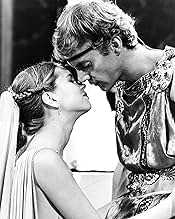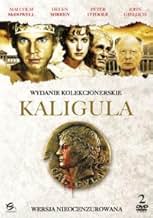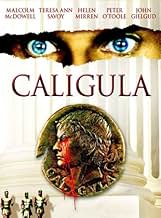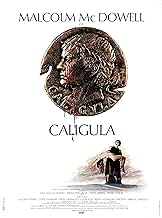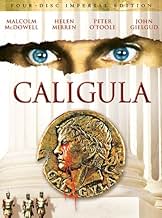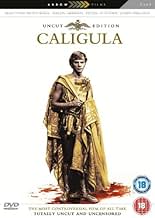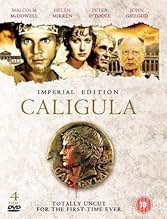Details der dramatischen und schockierenden, aber unbestreitbar tragischen Geschichte von Roms berüchtigtem Cäsar Gaius Germanicus Caligula.Details der dramatischen und schockierenden, aber unbestreitbar tragischen Geschichte von Roms berüchtigtem Cäsar Gaius Germanicus Caligula.Details der dramatischen und schockierenden, aber unbestreitbar tragischen Geschichte von Roms berüchtigtem Cäsar Gaius Germanicus Caligula.
- Auszeichnungen
- 1 Gewinn & 2 Nominierungen insgesamt
Mirella D'Angelo
- Livia
- (as Mirella Dangelo)
Rick Parets
- Mnester
- (as Richard Parets)
Pola Muzyka
- Subura Singer
- (as Paula Mitchell)
Joss Ackland
- Chaerea
- (English version)
- (Synchronisation)
- (Nicht genannt)
Empfohlene Bewertungen
For a period there, in the late 70s, we came very close to having real life in films. More real than ever. Oh, we had blood and tears, and an occasional breast, but the state of affairs was little different than that Disney TeeVee world where no bathrooms had toilets and sex was something oddly remote from the eye, always around the corner.
Partly, its that odd, odd American prudishness, that tut tut notion that invisible things are managed things. But partly there's the simple fact that no good case could be made for "watching." So a simple balance is maintained. Since sex sells, we'll have wet lips and vamping and wild joining of invisible parts. But we won't have life the way it really is, with all sorts of skin, intimacies and gentle touches. And smells.
Into this space you'll find various intrusions. I really thought "9 Songs" was immensely clever, justifiably cinematic. I also find from time to time clever ideas in ordinary porn. "Private Teacher" by an Orson Welles associate had some neat ideas sneaked in, as did "La Foire aux sexes" which was every bit a good new wave film.
And then you'll have something like this, which perhaps by itself set back the whole notion of intimacy in film three decades.
Its big, its loud, its stupid. Fortunately, this was before that insane silicone and shaved craze hit the girlie watcher's world. But its of the same ilk in a way.
Just think: Peter O'Toole, Hellen Mirren, John Geilgud for chrissakes! Not bad set design, in that Italian monstrosity tradition of Zefferelli. A script by Gore Vidal who knows nothing about how to flesh out a film (ouch, sorry), but whose larger arcs are solid. And Tinto Brass is not a bad filmmaker in the small, meaning he knows how to make a good image if not craft things as a project.
It could have worked, because by the late seventies, audiences had plenty of examples of performances that referenced and encapsulated other performances, so we could have what this could have been: a (film) performance of a (porn) performance of a (historical, voyeuristic-in-its-time) performance. And the projection of genital reality across those layers could have been intelligent as well as whatever else you may want.
For decades after Kinsey botched things with flawed science, Playboy was the vanguard of the sexual revolution. I'm not making this up; there really was a "Playboy philosophy" which boiled down to: "sex is natural and pleasant and if it doesn't hurt anyone, why not?" With hippies as a sort of mascot, this seemed intelligent, especially since the girlie pictures were surrounded with some of the best writing in print. Those centerfolds mattered.
Then along came a sort of second generation magazine which exploited the fact that Palyboy's girls had no body hair or genitals and were too linked to a set of obsolete fantasies. Penthouse girls had hair and fluids and were aggressive. Fewer coy blonds; more adventure. It was an equally vapid set of fantasies which as these things go went obsolete as quickly. But in the period of 76-80, that magazine was in the forefront of vaginal honesty in life. A forefront, such as society would allow.
And there was the Playboy tradition of wrapping things in intellectual goo. Which meant that this film could have been something that mattered, that changed things. It could have cast itself in the same useless space as the Romans it portrayed. But it made a strange bargain: the story has these acts as perverted, distorted life. Where ordinary films went way out of their way to not show certain things in sex, this went as far the other way to show them. Its a strange world where sexual positions and acts are arranged precisely so that you CAN see.
So I think like all great turning points in film, this film is important. Its not good, its ghastly. But its important because its mistakes hurt us in places that matter and missed an opportunity to make film better, richer.
Ted's Evaluation -- 1 of 3: You can find something better to do with this part of your life.
Partly, its that odd, odd American prudishness, that tut tut notion that invisible things are managed things. But partly there's the simple fact that no good case could be made for "watching." So a simple balance is maintained. Since sex sells, we'll have wet lips and vamping and wild joining of invisible parts. But we won't have life the way it really is, with all sorts of skin, intimacies and gentle touches. And smells.
Into this space you'll find various intrusions. I really thought "9 Songs" was immensely clever, justifiably cinematic. I also find from time to time clever ideas in ordinary porn. "Private Teacher" by an Orson Welles associate had some neat ideas sneaked in, as did "La Foire aux sexes" which was every bit a good new wave film.
And then you'll have something like this, which perhaps by itself set back the whole notion of intimacy in film three decades.
Its big, its loud, its stupid. Fortunately, this was before that insane silicone and shaved craze hit the girlie watcher's world. But its of the same ilk in a way.
Just think: Peter O'Toole, Hellen Mirren, John Geilgud for chrissakes! Not bad set design, in that Italian monstrosity tradition of Zefferelli. A script by Gore Vidal who knows nothing about how to flesh out a film (ouch, sorry), but whose larger arcs are solid. And Tinto Brass is not a bad filmmaker in the small, meaning he knows how to make a good image if not craft things as a project.
It could have worked, because by the late seventies, audiences had plenty of examples of performances that referenced and encapsulated other performances, so we could have what this could have been: a (film) performance of a (porn) performance of a (historical, voyeuristic-in-its-time) performance. And the projection of genital reality across those layers could have been intelligent as well as whatever else you may want.
For decades after Kinsey botched things with flawed science, Playboy was the vanguard of the sexual revolution. I'm not making this up; there really was a "Playboy philosophy" which boiled down to: "sex is natural and pleasant and if it doesn't hurt anyone, why not?" With hippies as a sort of mascot, this seemed intelligent, especially since the girlie pictures were surrounded with some of the best writing in print. Those centerfolds mattered.
Then along came a sort of second generation magazine which exploited the fact that Palyboy's girls had no body hair or genitals and were too linked to a set of obsolete fantasies. Penthouse girls had hair and fluids and were aggressive. Fewer coy blonds; more adventure. It was an equally vapid set of fantasies which as these things go went obsolete as quickly. But in the period of 76-80, that magazine was in the forefront of vaginal honesty in life. A forefront, such as society would allow.
And there was the Playboy tradition of wrapping things in intellectual goo. Which meant that this film could have been something that mattered, that changed things. It could have cast itself in the same useless space as the Romans it portrayed. But it made a strange bargain: the story has these acts as perverted, distorted life. Where ordinary films went way out of their way to not show certain things in sex, this went as far the other way to show them. Its a strange world where sexual positions and acts are arranged precisely so that you CAN see.
So I think like all great turning points in film, this film is important. Its not good, its ghastly. But its important because its mistakes hurt us in places that matter and missed an opportunity to make film better, richer.
Ted's Evaluation -- 1 of 3: You can find something better to do with this part of your life.
This film, as with all, has good points and bad points.
In general, I feel that the good ones far outweigh the bad.
The film simply gives the story of the rise and death of Emperor Caligula in a very straight-forward manner. Indeed, it can be seen as shocking, but I think that this is a side-effect of it's desire to be realistic, rather than a deliberate act on the part of the film-makers.
The cinematography and camera work is awful. The huge sets seem at times almost claustrophobic which is an absolute crime considering the magnificence of them. There is also too much emphasis on Caligula himself, to the detriment of revealing some important traits in other characters, making them seem somewhat shallow at times.
The sex scenes are very well placed within the context of the film. I thought that only two scenes stood out as being unnecessarily overt, but for the most part, the explicitness is on the fringe of the focus of each scene, while also playing a major part in the atmosphere.
Never once did I feel that any dialogue was out of place, nor did the acting strike me as being bad.
By far the biggest problem with this film is the fact that the sexual content is widely advertised and therefore anticipated before viewing. This may cause people to focus dominantly on those scenes without really looking at the film as a whole. For me, it enhanced the film. Not in a particularly titillating way, but in the fact that there was no compromise during scenes of sexual acts. Roman orgies are regarded to have been extremely opulent and promiscuous - I found it refreshing to see one as it may have actually been rather than lots of fully-clothed laughing fat men pouring red wine over their faces and eating grapes while draped with female automatons.
In summary, Caligula definitely has it's place in film history due to it's controversy, but if you look beyond that controversy, you should find a rather good film which neatly tells the story of how power can turn someone into a madman.
In general, I feel that the good ones far outweigh the bad.
The film simply gives the story of the rise and death of Emperor Caligula in a very straight-forward manner. Indeed, it can be seen as shocking, but I think that this is a side-effect of it's desire to be realistic, rather than a deliberate act on the part of the film-makers.
The cinematography and camera work is awful. The huge sets seem at times almost claustrophobic which is an absolute crime considering the magnificence of them. There is also too much emphasis on Caligula himself, to the detriment of revealing some important traits in other characters, making them seem somewhat shallow at times.
The sex scenes are very well placed within the context of the film. I thought that only two scenes stood out as being unnecessarily overt, but for the most part, the explicitness is on the fringe of the focus of each scene, while also playing a major part in the atmosphere.
Never once did I feel that any dialogue was out of place, nor did the acting strike me as being bad.
By far the biggest problem with this film is the fact that the sexual content is widely advertised and therefore anticipated before viewing. This may cause people to focus dominantly on those scenes without really looking at the film as a whole. For me, it enhanced the film. Not in a particularly titillating way, but in the fact that there was no compromise during scenes of sexual acts. Roman orgies are regarded to have been extremely opulent and promiscuous - I found it refreshing to see one as it may have actually been rather than lots of fully-clothed laughing fat men pouring red wine over their faces and eating grapes while draped with female automatons.
In summary, Caligula definitely has it's place in film history due to it's controversy, but if you look beyond that controversy, you should find a rather good film which neatly tells the story of how power can turn someone into a madman.
Maybe it helps to be familiar with the history, Art, and literature of the Ancient Rome because "Caligula" is surprisingly truthful adaptation of the chapter about Caligula in "The Lives Of The Twelve Caesars by C. Suetonius Tranquillus, the Roman Historian. If you read the chapter dedicated to Nero, you'll be even more shocked because Nero was always fascinated by his uncle Caligula (he was a son of Caligula's sister Agrippina who later became a wife of Claudius who adopted Nero and made him the heir for the title and the power of Roman Emperor). Anyway, Nero made Caligula his role model and managed to surpass his uncle's' notorious fame.
The movie is notoriously famous for the plentiful scenes of real sex, including incest, necrophilia, rape, and orgies. The movie also includes quite nasty and gruesome scenes of torture, executions, murders, and humiliations but all of the events have been documented in the historical documents that still exist.
I don't think of the movie as a masterpiece or even a good movie for all of its 2.5 hours. It actually reminds the life of real Caligula. In his childhood and youth, he was adored by Roman people and especially by the army and he was a promising young man. When he grew up as a heir to the cruel and suspicious Tiberius, he had to hide his feelings and go through many humiliations in order to survive. Shrewd Tiberius said about his adopted grandson that "never humankind knew the better slave and the worse ruler than Caligula" and that he was rearing "a viper for the Roman people and a Phaethon for the world."
When the young man finally received an access to the absolute power it had absolutely corrupted him. It is also known that soon after becoming head of Roman Empire, Caligula suffered an illness and as the result of it, he became incredibly nasty, cruel, and suspicious man who had indulged in the worst acts of debauchery, cruelty, and sadism. The movie follows this pattern. I still think that it is an interesting movie with very good actors. Not every day you can see porn with Helen Mirren, Peter O'Toole, Sir John Gielgud, and of course, Mr. Clockwork Orange himself, Malcolm McDowell.
The movie is notoriously famous for the plentiful scenes of real sex, including incest, necrophilia, rape, and orgies. The movie also includes quite nasty and gruesome scenes of torture, executions, murders, and humiliations but all of the events have been documented in the historical documents that still exist.
I don't think of the movie as a masterpiece or even a good movie for all of its 2.5 hours. It actually reminds the life of real Caligula. In his childhood and youth, he was adored by Roman people and especially by the army and he was a promising young man. When he grew up as a heir to the cruel and suspicious Tiberius, he had to hide his feelings and go through many humiliations in order to survive. Shrewd Tiberius said about his adopted grandson that "never humankind knew the better slave and the worse ruler than Caligula" and that he was rearing "a viper for the Roman people and a Phaethon for the world."
When the young man finally received an access to the absolute power it had absolutely corrupted him. It is also known that soon after becoming head of Roman Empire, Caligula suffered an illness and as the result of it, he became incredibly nasty, cruel, and suspicious man who had indulged in the worst acts of debauchery, cruelty, and sadism. The movie follows this pattern. I still think that it is an interesting movie with very good actors. Not every day you can see porn with Helen Mirren, Peter O'Toole, Sir John Gielgud, and of course, Mr. Clockwork Orange himself, Malcolm McDowell.
This is the sort of film that I would have enjoyed stumbling upon as a 15 year old switching through late night BBC 2 and channel 4 at 3am in the morning.
I think I watched the 'Uncut version' of this film. I found it somewhat hard to follow or to understand every motive or decision other that the overlying top most story.
It was just wild decisions of mad man in my opinion. However, now reading details about the film, there would have been cuts and edits here and there that broke up the flow.
It did provoke some thoughts about what it might have been like to live in those times. How life had little value and could be taken away for very minor issues.
It also highlighted how certain types of entertainment media still existed, it just wasn't in the mainstream. As humans, we haven't progressed as much as we would like to think.
I have access to the Ultimate Cut version and watched about 5 mins of it so far. This version has 20 mins more in the run time, missing scenes and some rearranged, different angles and different audio/script.
In those 5 mins, I was able to get a better understanding of the story compared to the uncut version. It even briefly explained initial history of the making of the film. What I will do is probably revisit it in a month.
It was interesting to see Dame Helen Mirren in her physical prime. I've only ever seen her acting over the age of 45.
The film is gory in a low tech way. I don't think I know anyone that I could recommend this to.
I think I watched the 'Uncut version' of this film. I found it somewhat hard to follow or to understand every motive or decision other that the overlying top most story.
It was just wild decisions of mad man in my opinion. However, now reading details about the film, there would have been cuts and edits here and there that broke up the flow.
It did provoke some thoughts about what it might have been like to live in those times. How life had little value and could be taken away for very minor issues.
It also highlighted how certain types of entertainment media still existed, it just wasn't in the mainstream. As humans, we haven't progressed as much as we would like to think.
I have access to the Ultimate Cut version and watched about 5 mins of it so far. This version has 20 mins more in the run time, missing scenes and some rearranged, different angles and different audio/script.
In those 5 mins, I was able to get a better understanding of the story compared to the uncut version. It even briefly explained initial history of the making of the film. What I will do is probably revisit it in a month.
It was interesting to see Dame Helen Mirren in her physical prime. I've only ever seen her acting over the age of 45.
The film is gory in a low tech way. I don't think I know anyone that I could recommend this to.
Where to start..... First off, the sets are wonderful. They are lavish and look authentic of the time, except as if a madman on acid was given a gigantic budget and told to "go at it!" Peter O'Toole is wonderful as the aging Tiberius. Malcolm McDowell gives a great performance as the young Caligula who kills his way to the throne of the Roman Emperor and then soon leads a legacy of terror. The supporting actors do a fine job yet, most of the young ladies were actually Penthouse Pets and were there for eye candy and irrelevant sex scenes. Depending on which film you are watching, the uncut or the R-version, some scenes are extremely graphic. I would usually always recommend the uncut version as opposed to the chopped one, but in this instance, the full length film is purely indulgent. Scenes of sex and gore were added to satisfy the producers (Penthouse) and the expected audience, not to add anything to the story. However, I am and will always be a fan of excess, so get the full version! The story is strong and keeps you interested. McDowell is charming throughout, which is quite the feat considering he murders family members, rapes and molests men and women, and sleeps with his sister. For fans of excess and sleaze, i highly recommend. Viewers who are purely interested in the reign of the notorious ruler might want to skip this one.
Wusstest du schon
- WissenswertesDame Helen Mirren described this movie as "an irresistible mix of art and genitals". Although many actors would regret their involvement with the film, Mirren has remained proud of her role as "the most promiscuous woman in all of Rome", as she believed European Cinema was reaching a benchmark in sex positivity and "it was the time to do nudity". She was, however, taken aback with the film's hardcore footage.
- PatzerCaligula squeezes a lemon over a captured slave. Lemons did not reach Europe until the 2nd century, at least 100 years after Caligula's death.
- Crazy CreditsDue to numerous pending lawsuits and settlements at the time of the film's release, no one is technically fully credited for writing and directing the finished film.
- Alternative VersionenThe censored version of this film has been released of a few occasions in Australia. In March 1981, a censored, R rated release to cinemas was made by Roadshow. Roadshow Home Video subsequently released the same film version to video in September 1984. This version ran for 146 minutes (PAL). It was again re-released by a 'no name' video label in the late 1990's. The censored DVD version appeared in December 2004, released by Warner Vision. The uncut version has been released in Australia, this was the fully uncut, X rated 156 minute PAL version. It was released in January 1985 by 'Palace X Video' - a version that is now an extremely rare collector's item. The uncut version has since been rated R18+ by the Australian classification board in 2021.
- VerbindungenEdited into Video Macumba (1991)
Top-Auswahl
Melde dich zum Bewerten an und greife auf die Watchlist für personalisierte Empfehlungen zu.
- How long is Caligula?Powered by Alexa
Details
- Erscheinungsdatum
- Herkunftsländer
- Offizieller Standort
- Sprache
- Auch bekannt als
- Caligula: The Ultimate Cut
- Drehorte
- Produktionsfirmen
- Weitere beteiligte Unternehmen bei IMDbPro anzeigen
Box Office
- Budget
- 17.500.000 $ (geschätzt)
- Weltweiter Bruttoertrag
- 305 $
Zu dieser Seite beitragen
Bearbeitung vorschlagen oder fehlenden Inhalt hinzufügen


